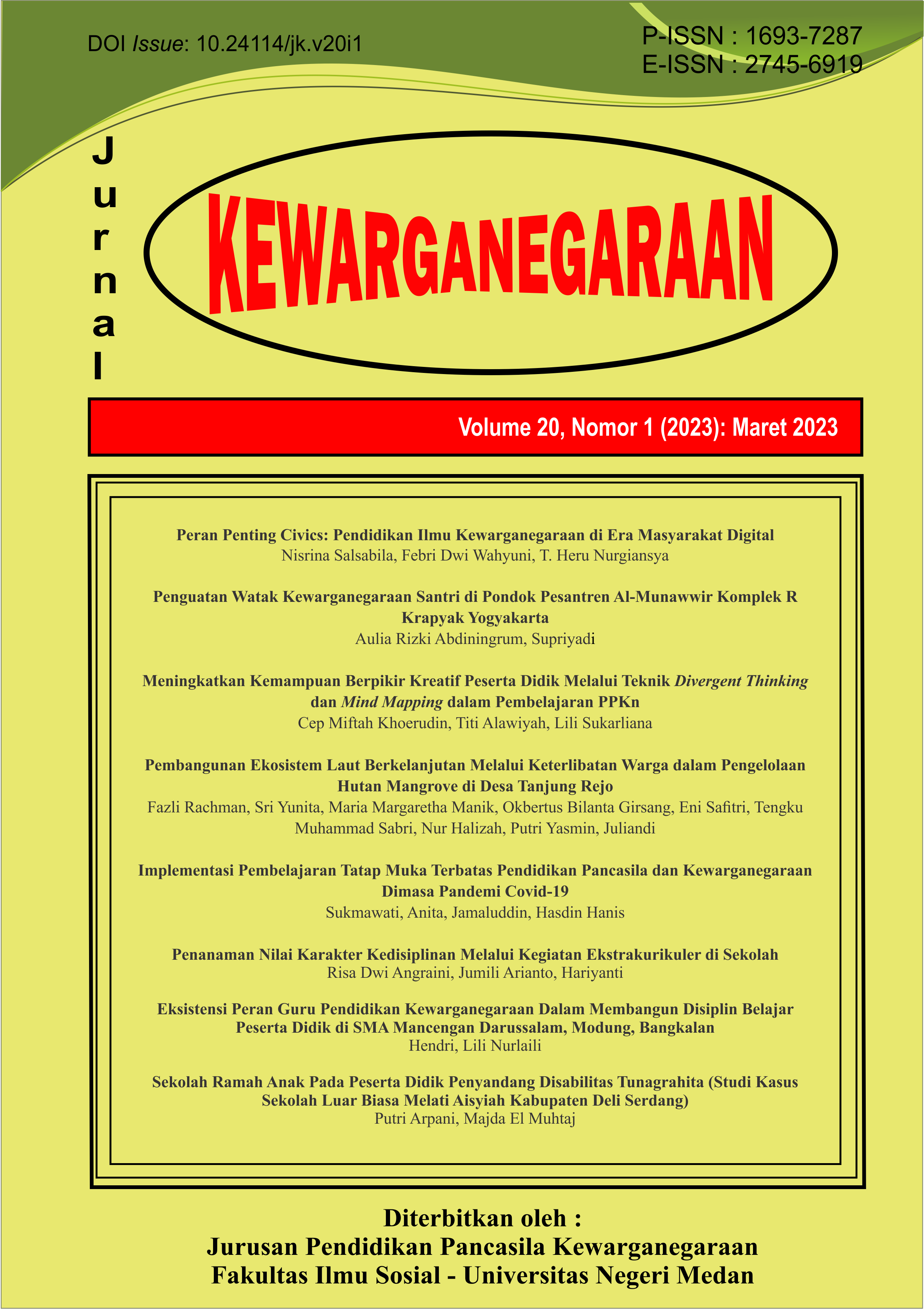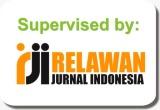Meningkatkan Kemampuan Berpikir Kreatif Peserta Didik Melalui Teknik Divergent Thinking dan Mind Mapping Dalam Pembelajaran PPKn
DOI:
https://doi.org/10.24114/jk.v20i1.43785Keywords:
creative thinking, divergent thinking, mind mapping, education, learners, berpikir kreatif, pendidikan, peserta didikAbstract
AbstractThinking skills are necessary to face complex and dynamic challenges in daily life. This study aims to identify the improvement of creative thinking skills through divergent thinking and mind-mapping techniques. The research method used is quasi-experimental with a pre-test and post-test control group design. The research sample consisted of 60 eighth-grade students in Bandung. The results of the study show that there is a significant difference in creative thinking skills between the experimental group, who were given divergent thinking and mind mapping techniques, and the control group, who were only given conventional learning. The t-test results show that the average score of the experimental group significantly increased from the pre-test, with an average of 80.01. In addition, the effect size test results show an influence of 0.912. This suggests that divergent thinking and mind-mapping techniques can be effective strategies to improve the creative thinking skills of students, and educators should consider using these techniques in the learning process to enhance students' creative thinking abilities.------------AbstrakKemampuan berpikir diperlukan menghadapi tantangan yang kompleks dan dinamis dalam kehidupan sehari-hari. Penelitian ini bertujuan untuk mengidentifikasi peningkatan kemampuan berpikir kreatif melalui teknik divergent thinking dan mind mapping. Metode penelitian yang digunakan adalah quasi-experimental dengan desain pre-test dan post-test control group. Sampel penelitian terdiri dari 60 orang peserta didik kelas VIII SMP di Kota Bandung. Hasil penelitian mengungkap bahwa terdapat perbedaan signifikan antara kualitas keterampilan berpikir kreatif pada kelompok eksperimen yang diberikan teknik divergent thinking dan mind mapping dengan kelompok kontrol yang hanya diberikan pembelajaran konvensional. Hasil uji t-test menunjukkan bahwa nilai rata-rata pada kelompok eksperimen meningkat secara signifikan dari pre-test dengan rata rata 80,01. Selain itu, hasil uji menggunakan effect size terdapat pengaruh sebesar 0,912. Hal tersebut menunjukkan bahwa teknik divergent thinking dan mind mapping dapat menjadi strategi yang efektif untuk meningkatkan kemampuan berpikir kreatif pada peserta didik yang berimplikasi adalah bahwa pendidik harus mempertimbangkan penggunaan teknik-teknik tersebut pada proses pembelajaran untuk meningkatkan keterampilan berpikir kreatif peserta didik.References
Acesta, A. (2020). Pengaruh Penerapan Metode Mind Mapping Terhadap Kemampuan Berpikir Kreatif Siswa. NATURALISTIC : Jurnal Kajian Penelitian Pendidikan dan Pembelajaran, 4(2b), 581“586. https://doi.org/10.35568/naturalistic.v4i2b.766
Chen, P. Z., Chang, T. C., & Wu, C. L. (2020). Effects of Gamified Classroom Management on the Divergent Thinking and Creative Tendency of Elementary Etudents. Thinking Skills and Creativity, 36(April), 1“9. https://doi.org/10.1016/j.tsc.2020.100664
Choirunnisa, T. (2023). Kemampuan Berpikir Kritis Siswa SMP dalam Pembelajaran PPKn Berbasis Masalah dengan Bantuan Media Video. AGORA: Jurnal Kajian Pancasila dan Kewarganegaraan, 11(05), 567“581.
Darusman, R. (2014). Penerapan Metode Mind Mapping (Peta Pikiran) Untuk Meningkatkan Kemampuan Berpikir Kreatif Matematik Siswa SMP. Infinity Journal, 3(2), 164“173. https://doi.org/10.22460/infinity.v3i2.61
Diani, R., Yuberti, Y., & Syafitri, S. (2016). Uji Effect Size Model Pembelajaran Scramble dengan Media Video Terhadap Hasil Belajar Fisika Peserta Didik Kelas X MAN 1 Pesisir Barat. Jurnal Ilmiah Pendidikan Fisika Al-Biruni, 5(2), 265“275. https://doi.org/10.24042/jpifalbiruni.v5i2.126
Fatmawati, B. (2016). The analysis of students™ creative thinking ability using mind map in biotechnology course. Jurnal Pendidikan IPA Indonesia, 5(2), 216“221. https://doi.org/10.15294/jpii.v5i2.5825
Fauziah, Y. N. (2011). Analisis Kemampuan Guru Dalam Mengembangkan Keterampilan Berpikir Kreatif Siswa Sekolah Dasar Kelas V Pada Pembelajaran Ilmu Pengetahuan Alam (Studi Komparatif Pada Guru Sekolah Dasar Kelas V di Beberapa Sekolah Dasar di Kota Bandung Tahun Ajaran 2010-201. Edisi Khusus, 2(Agustus), 98“106.
Khoerudin, C., Sapriya, S., & Sjamsulbachri, A. (2020). Critical Thinking Skills of Civic Education Teacher Candidates in Digital Age 21 Century. The Proceedings of the 4th International Conference of Social Science and Education, ICSSED 2020, August 4-5 2020, Yogyakarta, Indonesia. https://doi.org/10.4108/eai.4-8-2020.2302540
Knowles, R. T. (2018). Teaching Who You Are: Connecting Teachers™ Civic Education Ideology to Instructional Strategies. Theory and Research in Social Education, 46(1), 68“109. https://doi.org/10.1080/00933104.2017.1356776
Maidah, Gunadi, R. A. A., & Zulfitria. (2022). Pengaruh Strategi Pembelajaran dan Kemampuan Berpikir Kreatif Terhadap Hasil Belajar Siswa Pada Pelajaran PKn. Jurnal Instruksional, 2(1), 142“149. https://doi.org/10.24114/jtp.v8i1.3310
Manurung, L. H. (2019). Efektivitas Pembelajaran PKn Terhadap Pendidikan Karakter Siswa dalam Mempersiapkan Generasi Millennial. Prosiding Seminar Nasional Fakultas Ilmu Sosial Universitas Negeri Medan, 3, 908“911. Medan: Fakultas Ilmu Sosial Universitas Negeri Medan.
Nurgiansah, T. H., Hendri, & Khoerudin, C. M. (2021). Role Playing dalam Pembelajaran Pendidikan Pancasila dan Kewarganegaraan. Jurnal Kewarganegaraan, 18(1), 56“64. https://doi.org/10.24114/jk.v18i1.22597
Polat, Ö., & Aydın, E. (2020). The Effect of Mind Mapping on Young Children™s Critical Thinking Skills. Thinking Skills and Creativity, 38(December). https://doi.org/10.1016/j.tsc.2020.100743
Rachman, F., Nurgiansyah, T. H., & Kabatiah, M. (2021). Profilisasi Pendidikan Kewarganegaraan dalam Kurikulum Pendidikan Indonesia. Edukatif : Jurnal Ilmu Pendidikan, 3(5), 2970“2984. https://doi.org/10.31004/edukatif.v3i5.1052
Ramaina, R. (2022). Upaya Meningkatkan Efektifitas Pembelajaran PKN melalui Media Digital pada Kelas XI IPS 1 di SMA Negeri 3 Kerinci. Jurnal Ilmiah Dikdaya, 12(2), 445“451. https://doi.org/10.33087/dikdaya.v12i2.337
Shofia, E. A. L., Hobri, & Murtikusuma, R. P. (2018). Analisis Kemampuan Berpikir Kreatif Siswa Pada Materi Aritmetika Sosial Berbasis Jumping Task Ditinjau dari Gaya Kognitif Field Dependent dan Field Independent. Jurnal Kadikma, 9(3), 171“182. https://doi.org/10.19184/kdma.v9i3.11551.
Supiadi, E., Sulistyo, L., Rahmani, S. F., Riztya, R., & Gunawan, H. (2023). Efektivitas Model Pembelajaran Terpadu dalam Meningkatkan Kemampuan Berpikir Kreatif dan Hasil Belajar Siswa di Sekolah. Journal on Education, 05(03), 9494“9505.
Swalwell, K., & Payne, K. A. (2019). Critical Civic Education for Young Children. Multicultural Perspectives, 21(2), 127“132. https://doi.org/10.1080/15210960.2019.1606641
W.S, A. Y., Ihsan, & Handayani, S. R. (2020). Peningkatan Kreativitas Belajar dalam Pembelajaran PKn Melalui Model Discovery Learning Pada Siswa Kelas XI SMA UNIMUDA Sorong. Jurnal Pendidikan, 8(2), 153“159.
Wati, D. U., & Rahman, A. (2013). Meningkatkan Kemampuan Berpikir Kreatif Siswa Dengan Model Pembelajaran Berbasis Masalah dalam Mata Pelajaran Pendidikan Kewarganegaraan di Kelas VIIA SMP Negeri 2 Lamongan. Kajian Moral dan Kewarganegaraan, 1(1), 257“271.
Widowati, A. (2008). Impoving the Divergent Thinking Skill Using the Modified free Inquiry Approach To Teaching Science. Jurnal Penelitian dan Evaluasi Pendidikan, 11(1), 118“127. https://doi.org/10.21831/pep.v11i1.1422
Yang, J., & Zhao, X. (2021). The Effect of Creative Thinking on Academic Performance: Mechanisms, Heterogeneity, and Implication. Thinking Skills and Creativity, 40(June), 1“23. https://doi.org/10.1016/j.tsc.2021.100831
Downloads
Published
Issue
Section
License
Copyright (c) 2023 Cep Miftah Khoerudin, Titi Alawiyah, Lili Sukarliana

This work is licensed under a Creative Commons Attribution-ShareAlike 4.0 International License.
Authors published with the Jurnal Kewarganegaraan agree to the following terms:
- Authors retain copyright and grant the journal the right of first publication with the work simultaneously licensed under a Creative Commons Attribution License (CC BY-SA 4.0) that allows others to share the work with an acknowledgment of the work's authorship and initial publication in this journal.
- Authors are able to enter into separate, additional contractual arrangements for the non-exclusive distribution of the journal's published version of the work (e.g., post it to an institutional repository or publish it in a book), with an acknowledgment of its initial publication in this journal.
- Authors are permitted and encouraged to post their work online (e.g., in institutional repositories or on their website) prior to and during the submission process, as it can lead to productive exchanges, as well as earlier and greater citation of published work. (See The Effect of Open Access)
Licence

Jurnal Kewarganegaraan is licensed under a Creative Commons Attribution-ShareAlike 4.0 International License.








